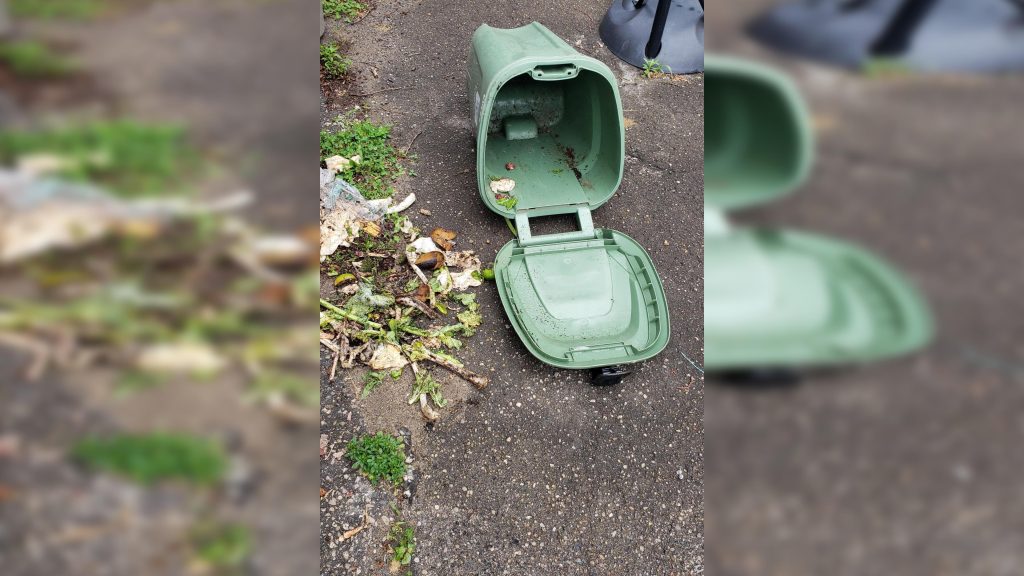The battle between London homeowners and the city’s increasingly clever raccoon population has reached a new level. Local residents are discovering that the green compost bins distributed by the city aren’t quite as raccoon-proof as they were promised to be.
The Problem: Raccoons Have Cracked the Code
What started as isolated incidents has become a widespread issue across London neighbourhoods. Despite the supposedly secure latching mechanism on the city-issued green bins, raccoons have figured out how to access the organic waste inside, leaving homeowners to clean up scattered compost materials from their driveways and yards.
The issue appears to stem from the raccoons’ ability to tip over the bins, which can cause the lids to pop open even when properly latched. Once the bin is on its side, these intelligent creatures can easily access the contents, creating messy situations for residents who wake up to find their organic waste strewn across their property.
Creative Solutions From the Community
London residents aren’t taking this invasion lying down. Local homeowners have developed several innovative approaches to keep their green bins secure, sharing practical tips through online discussions and neighbourhood conversations.
Bungee Cord Strategy
One of the most popular solutions involves using bungee cords to secure the bin lid. This simple and affordable approach adds an extra layer of security that makes it significantly more difficult for raccoons to access the contents, even if they manage to tip the bin over.
Strategic Positioning
Some residents have found success by positioning their green bins between their garbage and recycling bins, creating a stable formation that prevents the compost bin from being easily tipped. This method works particularly well when the bins are placed against a fence or wall for additional support.
Weight-Based Deterrents
Adding weight to the top of bins has shown mixed results. While some residents report success with placing heavy objects like concrete blocks on the lids, others note that determined raccoons simply knock the entire bin over, making this solution less reliable than hoped.
The Garage and Shed Solution
The most effective approach appears to be storing green bins in enclosed spaces like garages, sheds, or purpose-built storage areas. While this requires more effort on collection day, residents who use this method report virtually no issues with raccoon intrusion.
Some homeowners have invested in small storage sheds specifically for waste bins, though the cost can be prohibitive for many residents. Others have repurposed dog crates or built simple enclosures to protect their bins while keeping them outside.
Timing Strategies
Several residents have adjusted their waste management routines to minimize exposure time. Instead of putting bins out the night before collection, they’re setting them out early in the morning to reduce the window of opportunity for nocturnal raiders.
This approach requires coordination with collection schedules, as some areas see pickup trucks as early as 6:45 AM, creating challenges for residents who work afternoon or evening shifts.
Commercial Solutions and Accessories
Local hardware stores have begun stocking specialized garbage bin locks and raccoon-proof accessories in response to the growing demand. These products range from simple strap systems to more sophisticated locking mechanisms designed specifically for organic waste containers.
Some residents have also experimented with deterrent sprays and scent-based solutions, though results vary and these methods often require regular reapplication to remain effective.
The Freezer Method
An unconventional but reportedly effective approach involves freezing organic waste before disposal. Residents with extra freezer space store their compost materials frozen until collection day, which reduces odours that attract raccoons and makes the contents less appealing.
While this method requires additional planning and freezer space, those who use it report significantly fewer issues with wildlife interference.
Professional Recommendations
Wildlife control experts suggest that the key to success lies in eliminating the factors that attract raccoons in the first place. This includes using proper compostable bags, ensuring bins are clean, and minimizing odours through proper waste management practices.
The consensus among residents seems to be that while the city’s green bins serve their environmental purpose, the design may not have adequately considered the intelligence and determination of London’s urban wildlife population. The original Reddit discussion highlighted this ongoing struggle between residents and these persistent creatures

